On 9 March 2025, YUVA’s annual ComplexCity Festival came alive with the energy of the Making Mumbai Youth Convention at Maharashtra Nature Park, Dharavi. Over 350 young people from marginalised communities across the city gathered to share their stories, discuss youth resilience and mental well-being, topics that are often overlooked but deeply affect our daily lives.
Starting the day with reflection and solidarity
The convention began with poems and songs led by our cultural team Goonj, including Kamala Bhasin’s “Irade kar buland” (Make your resolve strong), setting the tone for a day of open conversation.
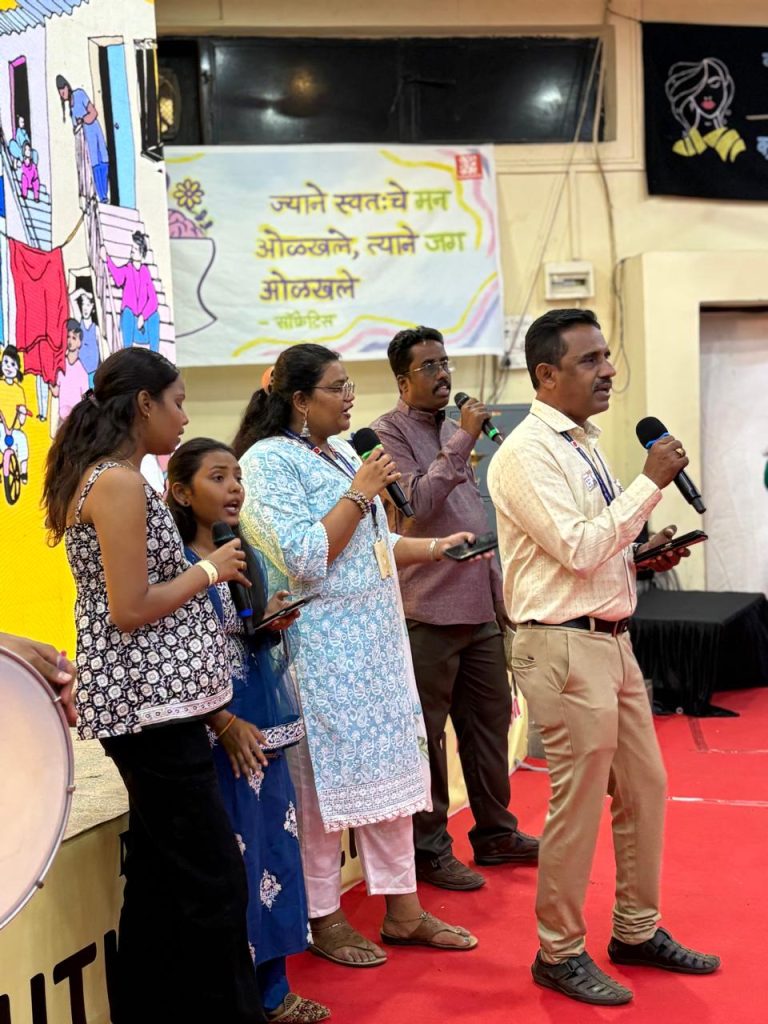
A Constitutional Pledge was taken that reminded everyone of their rights—not as favours, but as fundamental guarantees. The vision behind ComplexCity was introduced, explaining how the festival has evolved over eight years to address issues like inclusive cities, gender justice, and climate action, not just as one-day discussions but as year-long commitments that young people across Mumbai take forward through their work each day.
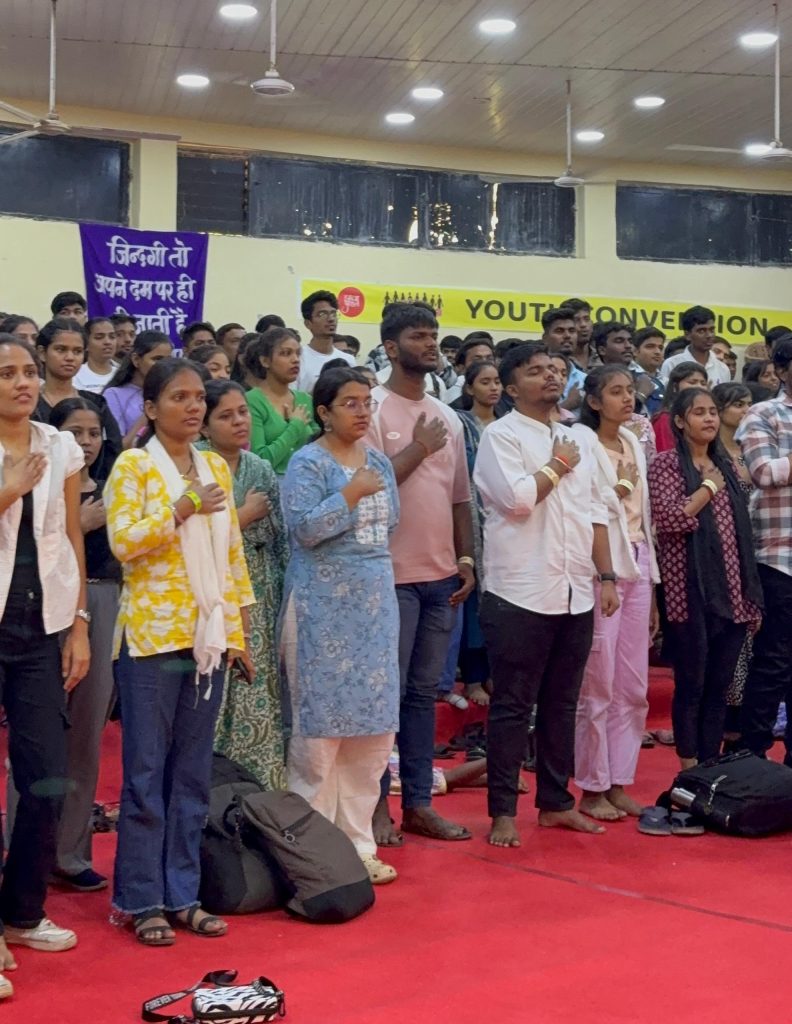
A Play That Made Everyone Think
The convention featured a simple but powerful play about a young man balancing his mother’s illness, financial struggles, and pressures at work. In the scene, he cooks for his sick mother while rushing to get ready for his job. When he arrives late, his boss scolds him harshly, refusing to listen to his reasons.
The play paused at this tense moment, and the audience was asked: “What would you do in his situation?” Responses varied—some suggested “He should speak honestly and explain everything. If the boss still doesn’t care, maybe it’s time to look for a better place to work.” Others offered alternative ways to cope, showing how different people navigate challenges in their own ways. But one thing was clear: the problem wasn’t just about the individual—it was equally the system around him.
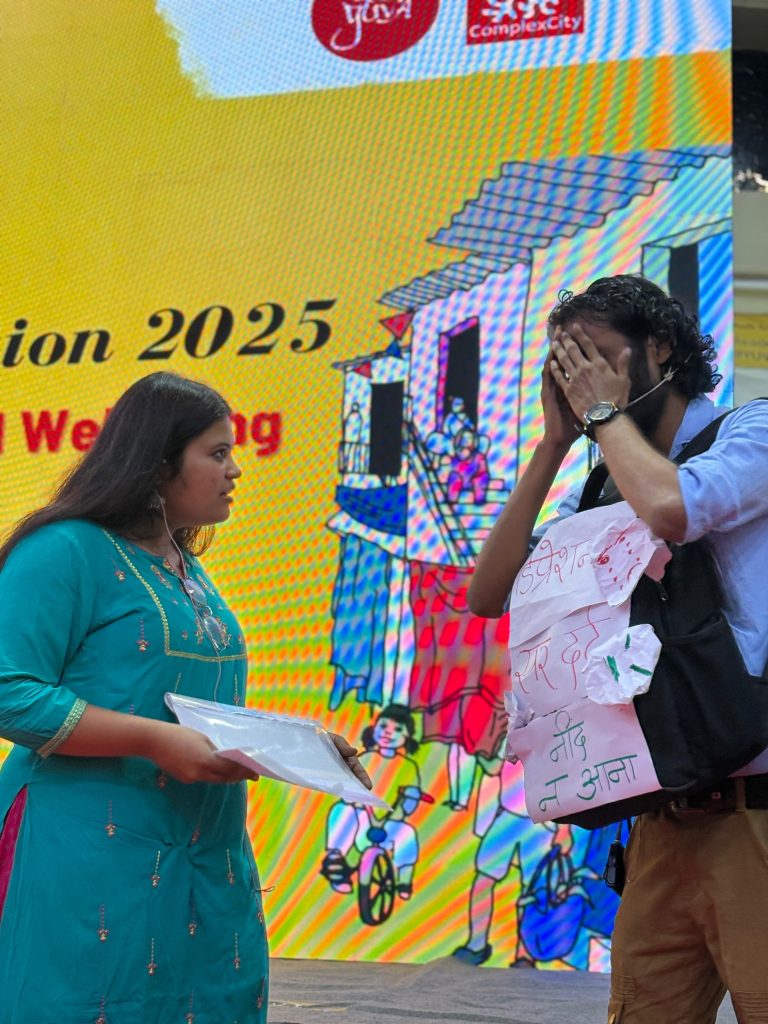
Panel Discussion: Understanding Mental Well-Being and Resilience
The panel discussion brought together rich and diverse grassroots experiences of mental wellbeing and resilience building, with three experts offering interconnected perspectives shaped by their work in psychosocial care, youth engagement, and community-based mental health advocacy.
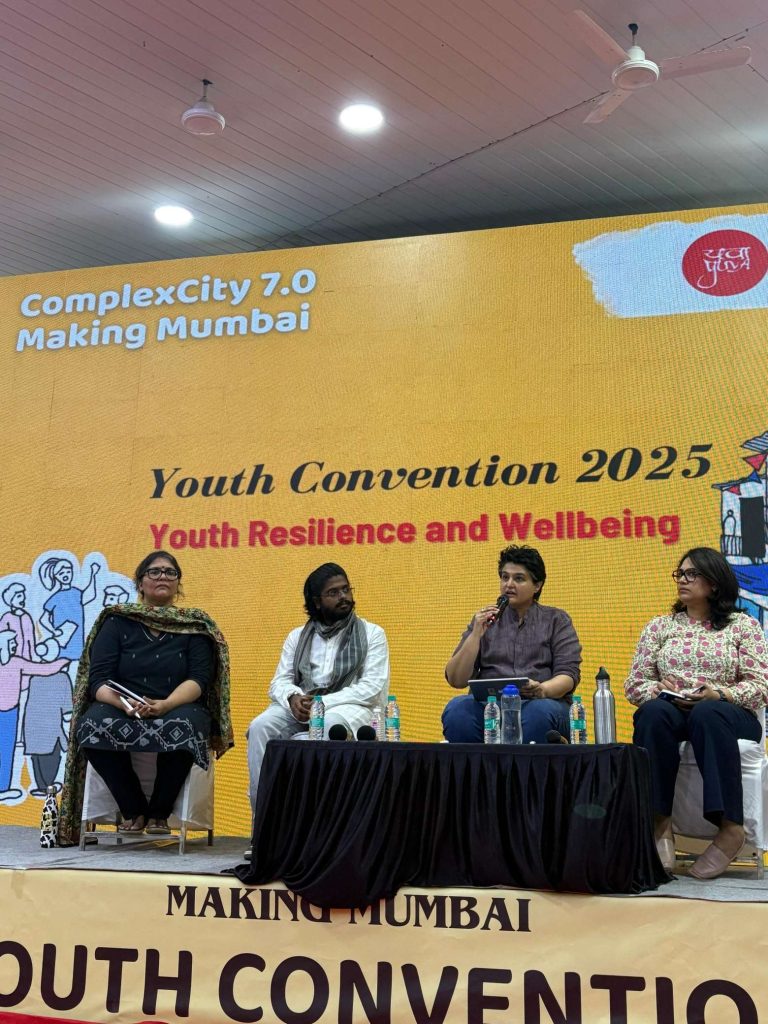
Raj reframed mental health not just as a personal struggle but as a systemic issue rooted in social and structural inequalities, explaining how factors like caste discrimination, patriarchy, and economic inequality shape mental well-being, using the example of migrant workers during COVID-19.: “These weren’t cases of ‘anxiety disorders’ – they were people responding rationally to systemic abandonment when forced to walk hundreds of kilometres home.”
Raj Mariwala’s intervention was particularly impactful in connecting personal struggles to larger systems, explaining how diagnostic labels like “depression” often medicalise what are actually rational responses to oppressive conditions.“When a Dalit student faces caste discrimination in classrooms,” Raj Mariwala put a question, “Should we call their distress a ‘mental health issue’ or recognise it as institutional violence?”
Jasmine Kalha, Program Manager and Research Fellow at Centre for Mental Health Law and Policy, Indian Law Society, built on this by challenging how we talk about mental health stigma. She argued that while awareness campaigns focus on reducing stigma, real change requires addressing the discrimination that causes the stigma in the first place. Jasmine highlighted the Mental Health Act, 2017 as an important but underutilised tool, since it legally recognises mental healthcare as a right.
Swapnil Shinde, a youth leader with the “Me to Diary” initiative, brought the discussion to a personal level by sharing how peer support groups operate as alternative spaces for mental well-being. He described how these groups intentionally function outside dominant societal norms—allowing vulnerability without judgment, encouraging emotional expression beyond gender expectations, and maintaining flexibility so no one feels trapped. Swapnil’s examples showed how young people are already building the kinds of supportive communities the panelists were advocating for. However, as highlighted in this India Development Review (IDR) article on mental well-being from the grassroots, such spaces need to be consistently nurtured through trust-building, collective care, and sustained community engagement to truly transform how mental health is understood and supported.
Breakout Sessions: From Discussion to Practical Solutions
The afternoon breakout sessions allowed participants to explore deeper into specific aspects of mental well-being in spaces they navigate daily- homes and bastis, workplaces and classrooms, digital worlds and relationships. In each room, they shared real struggles and practical ways to cope, turning abstract ideas into practical solutions they could actually use.
In the digital intervention space, facilitators and participants talked honestly about both the risks and opportunities in online interactions. They examined how relationships form differently in digital contexts, from dating apps to anonymous chat platforms. The conversation particularly highlighted how LGBTQ+ youth often face exploitation in these spaces, but also sometimes find their first communities of support. Practical safety strategies were shared, like using secure messaging apps and knowing how to report harassment.
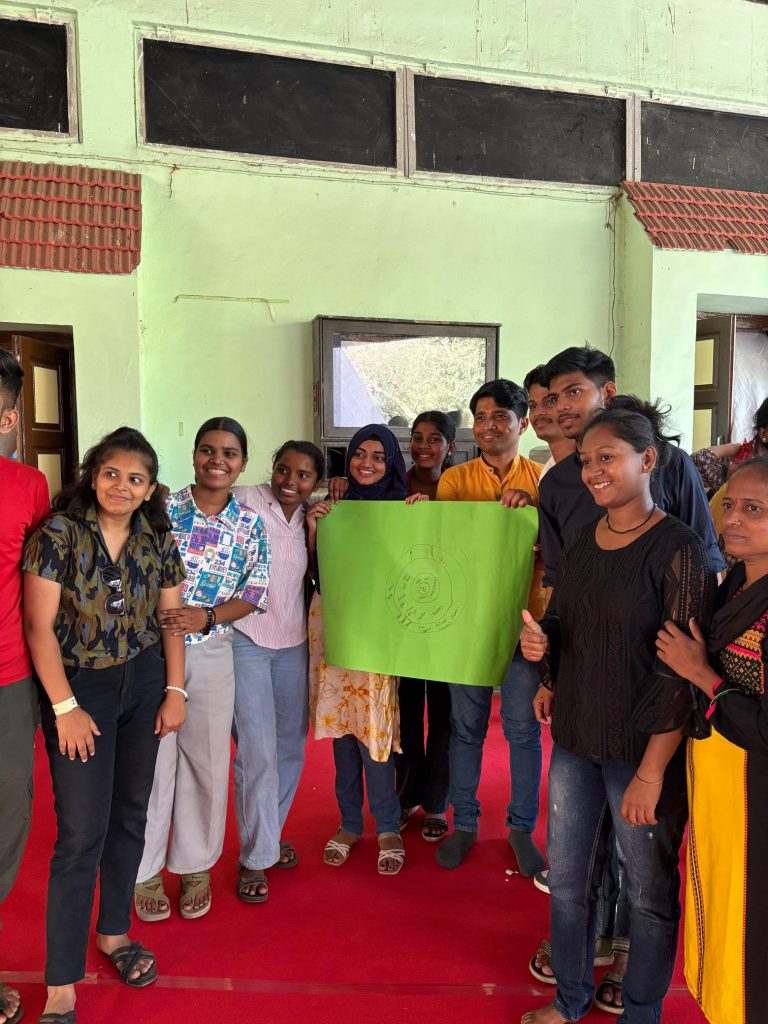
The education and workplace session surfaced many systemic barriers that young people face. Students described how caste and gender discrimination follow them into classrooms, while young workers shared stories of exploitation in informal jobs. What made this discussion powerful was how participants collectively explored potential solutions—such as forming student support groups and advocating for clearer workplace policies. These suggestions recognised that individual coping mechanisms aren’t enough without systemic changes, highlighting the role of community and institutional support in addressing mental well-being.
In the community and family session, participants reflected on how ideas of “normal” mental health are often shaped by those in power. Young people shared how their families sometimes unintentionally reinforce stigma, even while trying to help. The session didn’t offer easy answers, but created space for honest conversation about navigating these complex relationships while protecting one’s well-being.
Key Takeaways: A Step Toward Change
What made this convention unique was how it balanced hard truths about systemic injustice with practical discussions about how to care for oneself and others in the current reality. The day didn’t end with false promises that everything would change immediately, but with a clearer shared understanding of both the challenges and the ways forward. Participants left not just with new knowledge, but with connections to others who face similar struggles—perhaps the most important resource for resilience of all.
The conversations weren’t just for that day—they are meant to carry on. YUVA’s ongoing work through ComplexCity and other initiatives continues to create spaces where young people can keep building this vision of a Mumbai that supports everyone’s mental wellbeing.
After a day of serious and meaningful discussions about mental well-being and resilience, the convention ended on a lighter note. Deep Naik, a talented mime artist, took the stage with his playful performance, bringing smiles and laughter to everyone. His light-hearted act offered a much-needed break after hours of serious discussion—a moment to unwind and enjoy.
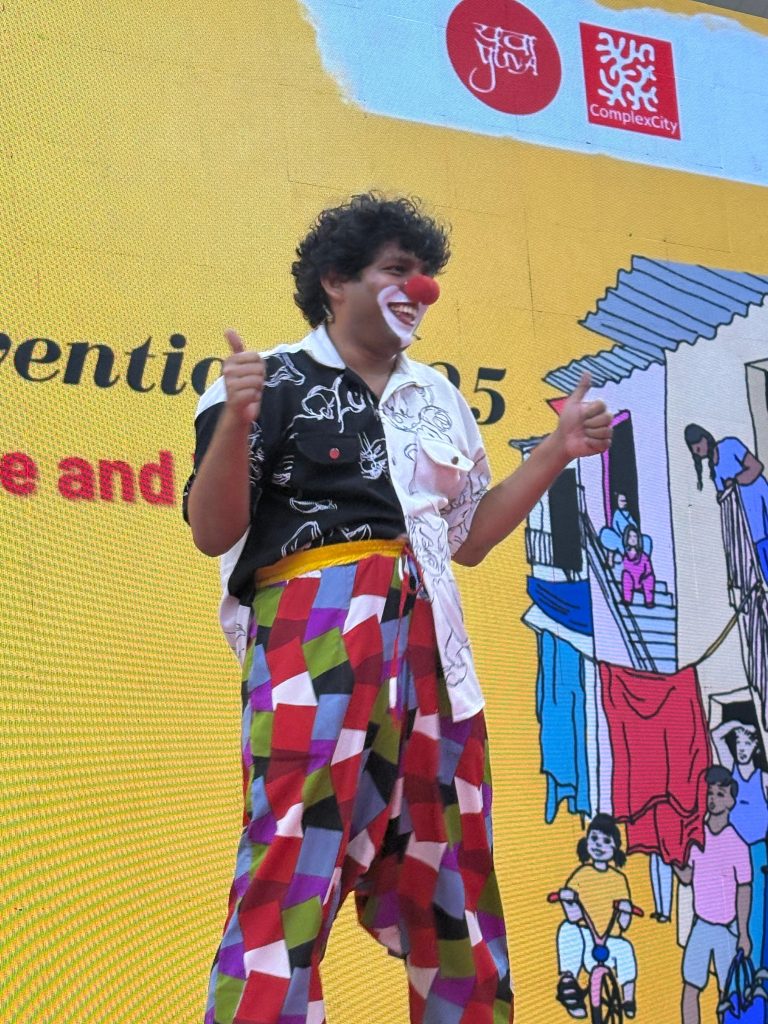
Soon, the whole room was on their feet, dancing and singing along. It was a simple, happy moment—young people who had spent the day talking about struggles now celebrating together, reminding themselves that joy is just as important as the work for change. The event ended with connection, laughter, and a shared sense of hope!
Resources & References:


